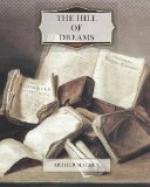When, of an evening, he was secure in his room, the blind drawn down and the gas flaring, he made vigorous efforts toward sanity. It was not of his free will that he allowed terror to overmaster him, and he desired nothing better than a placid and harmless life, full of work and clear thinking. He knew that he deluded himself with imagination, that he had been walking through London suburbs and not through Pandemonium, and that if he could but unlock his bureau all those ugly forms would be resolved into the mist. But it was hard to say if he consoled himself effectually with such reflections, for the return to common sense meant also the return to the sharp pangs of defeat. It recalled him to the bitter theme of his own inefficiency, to the thought that he only desired one thing of life, and that this was denied him. He was willing to endure the austerities of a monk in a severe cloister, to suffer cold, to be hungry, to be lonely and friendless, to forbear all the consolation of friendly speech, and to be glad of all these things, if only he might be allowed to illuminate the manuscript in quietness. It seemed a hideous insufferable cruelty, that he should so fervently desire that which he could never gain.
He was led back to the old conclusion; he had lost the sense of humanity, he was wretched because he was an alien and a stranger amongst citizens. It seemed probable that the enthusiasm of literature, as he understood it, the fervent desire for the fine art, had in it something of the inhuman, and dissevered the enthusiast from his fellow-creatures. It was possible that the barbarian suspected as much, that by some slow process of rumination he had arrived at his fixed and inveterate impression, by no means a clear reasoned conviction; the average Philistine, if pressed for the reasons of his dislike, would either become inarticulate, ejaculating “faugh” and “pah” like an old-fashioned Scots Magazine, or else he would give some imaginary and absurd reason, alleging that all “littery men” were poor, that composers never cut their hair, that painters were rarely public-school men, that sculptors couldn’t ride straight to hounds to save their lives, but clearly these imbecilities were mere afterthoughts; the average man hated the artist from a deep instinctive dread of all that was strange, uncanny, alien to his nature; he gibbered, uttered his harsh, semi-bestial “faugh,” and dismissed Keats to his gallipots from much the same motives as usually impelled the black savages to dismiss the white man on an even longer journey.




